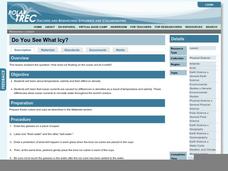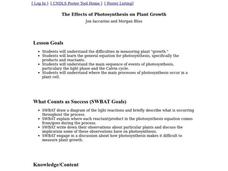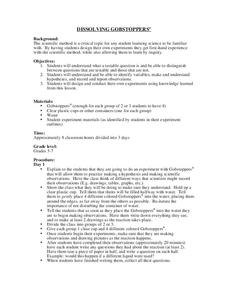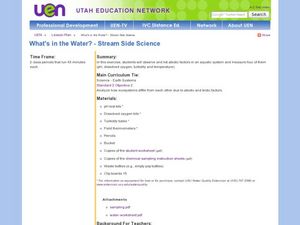Curated OER
Reasons for the Seasons
This worksheet requires the pupils to follow a teacher activity, so more-than-the-usual preparation for a practical is needed. Looking at a globe as it rotates and receives "sunlight" from a flashlight, pupils are able to observe the...
Polar Trec
Do You See What Icy?
Here is a lesson that kicks off with a question. "How does ice floating on the ocean act as it melts?" As learners investigate this natural phenomenon, they'll discover that it has a lot to do with temperature, salinity, and the effect...
Curated OER
Connect the Spheres: Earth Systems Interactions
Is everything really connected? Take your class on a walk outside, where they will make observations and write them down on a worksheet. Once they are back in the classroom, learners will work to determine if and how things like birds,...
Cornell University
Nano What?
The size of a nanoparticle is difficult for pupils to grasp. A hands-on experiment is designed to give your classes perspective. Learners analyze different sports drinks for the content of electrolytes as an introduction to nanoscale....
American Museum of Natural History
Keeping a Field Journal
Recording scientific evidence allows for important discoveries and conclusions. A remote learning resource outlines how to create a field journal to record scientific observations. The outline resource includes notation about the...
Curated OER
Introduction to Adaptation
Tenth graders observe collections of specimens and discuss their answers to provided questions. They explore common ancestry, homology, analogy, adaptive radiation, and evolution, while formulating creative answers based on their...
Curated OER
Preparation and Staining of Mammal Cells to View Sister Chromatids
Observation of sister chromatids is possible as students culture and stain mammal tissue cells.
Curated OER
Perceiving Place
Students observe how color creates the mood of a place, and generate sketches and drawings that capture their observations.
Curated OER
Forest Layers
Fourth graders observe the layers of the forest on a walk in the woods. They break up into groups to create murals, posters, or brochures illustrating the forest layers of Washington's Lowland Forests.
Curated OER
Brief Encounter (Looking at Ourselves and Others)
Students participate in a simulation game in which they realize what it is like to be from another culture. They observe and describe different behaviors. They also examine values from other cultures.
Curated OER
What's The World Made Of?
Second graders identify the three states of matter by examining fishbowls with various contents. They discuss their observations and the characteristics of matter in each state. Pupils read the story The Rainbow Fish and look for...
Curated OER
The Effects of Photosynthesis on Plant Growth
Students are able to draw a diagram of the light reactions and briefly describe what is occurring throughout the process. They are able to explain where each reactant/product in the photosynthesis equation comes from/goes during the...
Curated OER
Dissolving Gobstoppers
Students design their own experiments . They study the scientific method and determine what a testable question is. They distinguish between questions that are testable and those that are not. They identify variables, make and understand...
Curated OER
Put Your Best Facade Forward-Lesson 1
Learners are introduced to the applied arts and focus on the applied art of architecture. They examine how architecture communicates messages about the people in a community who use a building. Students study the facade of their school...
Curated OER
Our Playground!
First graders observe and explore the playground's environment by walking around the playground, followed by a group discussion of what they observed. They then divide into groups and participate in centers, their brought back together...
Curated OER
Move It!!!
Students explore motion by observing the movement of people and duplicating those movements. They compare and contrast various kinds of movements and identify different types of movements in pictures. They build an object that can be...
Curated OER
Eutrophication
Students observe the effects of eutrophication and determine why it is harmful to aquatic ecosystems. They create mason jar ecosystems to observe the growth of algae in pond water. In addition, they observe the effect of introducing...
Curated OER
What's in the Water? - Stream Side Science
Here is a complete activity in which young biologists or ecologists test the pH, dissolved oxygen, turbidity and temperature of stream water. The class visits an actual stream and makes observations of the site. They use scientific...
Science Friday
Mineral Madness
Science does not need to be as hard as a rock. Pupils test 10 different minerals to determine their properties. The learners observe luster, streak, hardness, and fluorescence for each specimen. Afterwards, they compare and contrast the...
Concordia University Chicago
A Bar at the Folies-Bergere by Édouard Manet
Observation is a key skill any scientist, artist, or writer needs to hone. Learners first discuss Manet's A Bar at the Folies-Bergere, then they set up a place to observe the people in their school. They closely observe and sketch what...
Knoxville Art Museum
Lee Walton: Codes in Drawings
Familiar with the systems-based sports drawing of experimental artist Lee Walton? If so, this drawing exercise if for you. Young artists observe an activity over time, develop a coded language for the activity, and then draw a...
Peace Corps
Brief Encounters
How are Pandyas different than Chispas? Explore cultural norms and societal behaviors with an engaging role-play activity. Split into groups of two hypothetical cultural groups, the formal Pandyas and the sociable Chispas, and another...
It's About Time
Chemistry and Physical Changes
Engage the class like never before as pupils learn to differentiate between multiple physical and chemical changes by conducting a list of small experiments, most often with household materials. They make observations and discuss the...
Teach Engineering
Exploring Capillary Action
Explore capillary action from different perspectives. In the fourth installment of a nine-part series, scholars perform several experiments to observe capillary action. They look at the meniscus of water in a glass, observe capillary...
Other popular searches
- Observing Venus
- Observing Nature
- Observing the Night Sky
- Observing Simple Machines
- Observing Sensory Details
- Observing Protists
- Observing Trees
- Observing the Sky
- Observing Amoeba
- Observing Stars
- Observing Animals
- Observing Properties

























